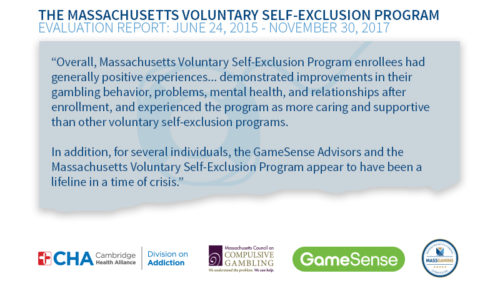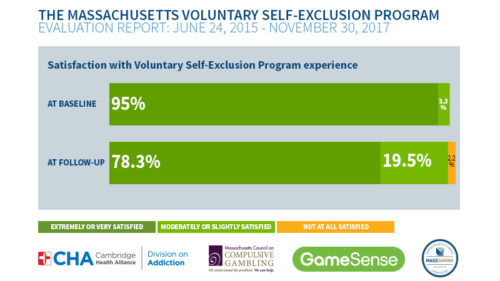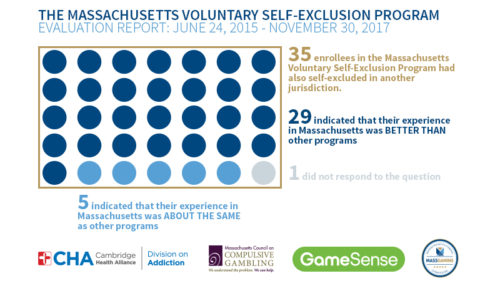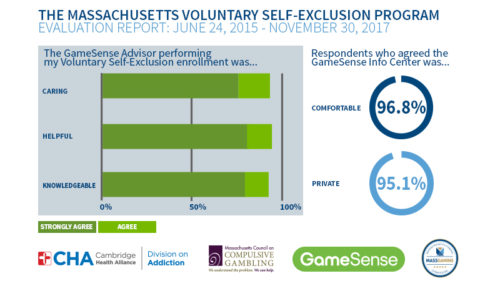The Massachusetts Gaming Commission Releases Two-Year Evaluation of Voluntary Self-Exclusion Program
- September 27, 2018
- by MGC Communications
- 0 comments
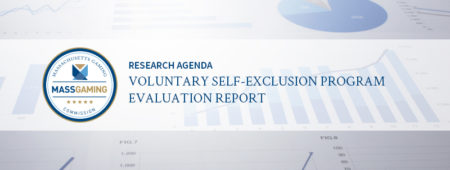
Today researchers from the Cambridge Health Alliance, Division of Addiction presented the Massachusetts Gaming Commission (MGC) with an evaluation of the Massachusetts Voluntary Self-Exclusion program (MA-VSEP) after the second year of operation at Plainridge Park Casino (PPC) in Plainville, Massachusetts. Among other findings, the study concludes that Massachusetts residents in the program gamble significantly less and experience overall improvements in mental health following enrollment. A vast majority of participants said they were satisfied with the enrollment process, and found the program to be more “caring and positive” than other out-of-state enrollment processes.
The statewide program, implemented by the MGC and the Massachusetts Council of Compulsive Gambling (MCCG), allows individuals to voluntarily exclude themselves from the gaming floor of all Massachusetts casinos for a pre-determined length of time. MA-VSEP provides participants the flexibility to choose their term of self-exclusion from six-months to a lifetime. As a deterrent from continued gambling at Massachusetts casinos, any person on the VSE list identified on the gaming floor will be escorted from the area and must forfeit any money wagered.
As part of MGC’s comprehensive research agenda, the commission contracted with the Division of Addiction to evaluate the implementation of MGC’s reduction strategies for gambling-related harm, including the Voluntary Self-Exclusion Program; this research report summarizes data collected from the program and its enrollees over twenty-nine months of operation in Massachusetts. According to the study, research goals were to (1) evaluate the program as implemented in collaboration with PPC, and (2) assess the gambling behaviors problems, mental health and well-being of VSE enrollees over time.
The evaluation states, “Overall, MA-VSEP enrollees had generally positive experiences with the MA-VSEP, demonstrated improvements in their gambling behavior, problems, mental health, and relationships after enrollment, and experienced the program as more caring and supportive than other VSE programs. In addition, for several individuals, the GameSense advisors and the MA-VSEP appear to have been a lifeline in a time of crisis.”
Additional research findings include:
- Among the 35 MA-VSEP enrollees who completed the follow-up survey and indicated that they had already participated in VSE in another state or at another casino, 82.8% indicated that their experience with MA-VSEP was better than their experience with other program(s), 14.3% indicated it was about the same, and 2.9% did not respond to the question.
- More than 40% of MA-VSEP enrollees who completed the follow-up interview indicated that MA-VSEP enrollment influenced them to access additional help and resources.
- Overall more than 75% of MA-VSEP enrollees who completed the baseline interview were extremely satisfied with their MA-VSEP enrollment experience, and another 20% reported being very satisfied. Only 3% reported being slightly or moderately satisfied, and no one reported dissatisfaction. At follow-up, these numbers declined somewhat. Thirty-seven percent of the MA-VSEP enrollees who completed the follow-up interview were extremely satisfied, 41.3% were very satisfied, 15.2% were moderately satisfied, 4.3% were slightly satisfied and 2.2% were not at all satisfied.
“Research has clearly shown that voluntary self-exclusion can effectively help persons struggling to control their gambling,” said Mark Vander Linden, MGC’s director of research and responsible gaming. “We recognize that the decision to stop gambling can be a difficult, but the process to do so shouldn’t be. It is gratifying to know that enrollees feel supported when they make this difficult decision. We will build upon this early positive feedback to look for ways to help individuals experiencing problems in their life caused or related to gambling. ”
Read the full evaluation.
Visit the GameSense website to review most Frequently Asked Questions about VSE.
